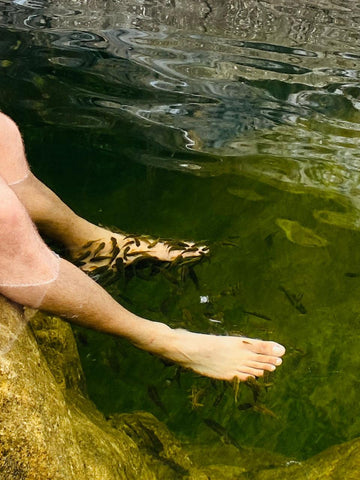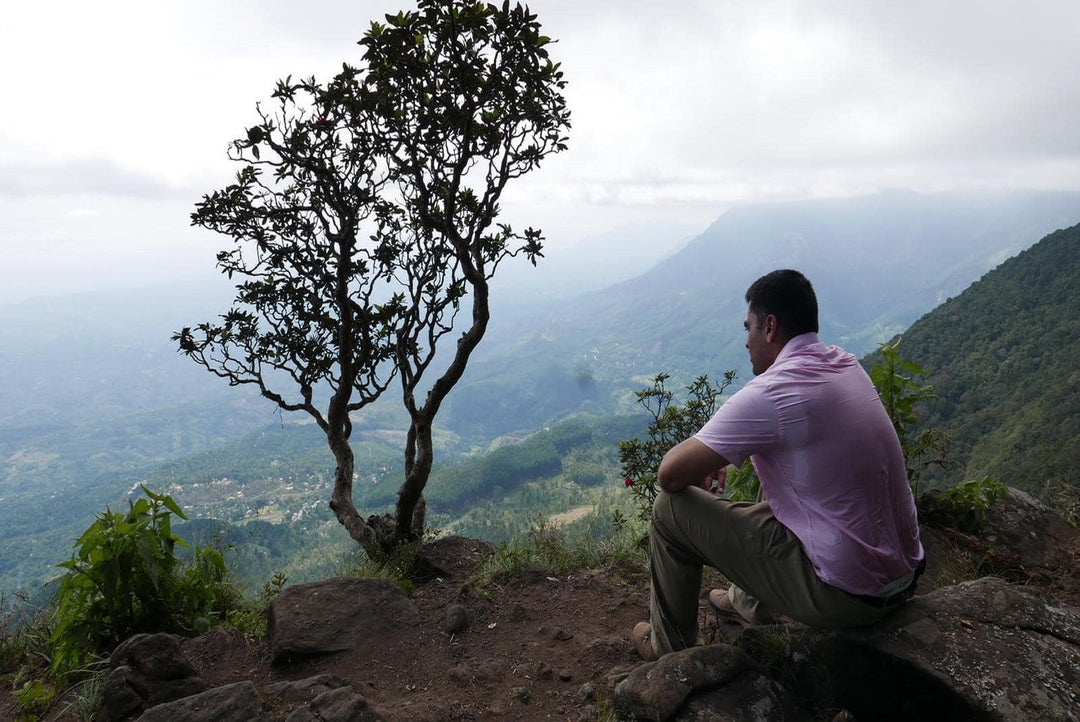30 Foot Tea Bushes and Leeches
I appreciate that this is longer than normal posts but as I have just returned from the Jungle, I thought you may like to experience one of my field trips and hear about the challenges and the joys of a full day in the jungles of Sri Lanka.
I have visited many commercial plantations and participated in lots of field rounds over the years. Rarely though have I been on a field round like the one that Buddhika Dissanayakke took me on when I visited Forest Hill recently.
Many of you will know that PMD's spiritual home is in Maskeliya at the foothills of Sri Pada. There are three routes to the peak and whilst the Maskeliya route is the most popular, and shortest of the routes there are another two that are less well travelled.

A view of Sri Pada (Adams Peak) from the Maskeliya side
Buddhika's Forest Hill factory is in Kuruwita, and I met him at his micro factory in Kuruwita. Buddhika sources his tea leaves from a now lost estate known as Waranagala. The estate was established over 130 years ago but has been abandoned for over 100 years.
We set off from the base of the Kuruwita trail to Sri Pada in search of this lost estate. Whilst walking through the trail, Buddhika had me tasting plants that grow by the trail. The first plant we came across was wild growing pepper. He explained that all commercial plants we use today originated from wild growing plants like these.
Walking up steep gradients through the hot steamy climate of the low country was tough going, but very rewarding when you took in the beautiful landscapes. Along the way we passed hikers who were planning on making the ascent to Sri Pada later that evening. As we walked on Buddhika showed me a coffee plant growing next to a tea tree that had a pepper vine growing up the trunk of the tea tree.

The jungle foot spa
An hour and a half later we left the trail and walked through some dense forest and came to a waterfall and a large stone crossing area. This was our first stop. The waterfall, the peace and quiet and tranquillity was truly magical. I was even able to have a natural foot spa courtesy of the small fish in the water. We walked back into the jungle where we found thirty-to-forty-foot trees that had grown from seed and then further up the trail into the lost estate.
We passed two rest areas known in Sri Lanka as an Ambalama. The first was the former Waranagala Tea factory building that once produced tea. The second the Superintendents bungalow where the original owner of Waranagala would have lived.

The Waranagala Tea planters bungalow now a Ambalama providing rest for weary pilgrims
Cutting through the thick jungle is tough and the conditions are wet and the perfect environment for leeches. Rasika who is based in our Colombo office came armed with the bottle of citronella spray and was furiously spraying his lower limbs with the oil. Citronella wards off leeches and even if one does latch on a quick spray will release the fangs.
(Not for the Squeamish - You should never rip off a leech from the skin. Its fangs will be left under the skin causing infection in the days to come, spraying of citronella oil, or using a match or a lighter releases the fangs and allows you to flick the leech away)

The lengths we go to source great tea
As we continued our walk through the jungle, remnants of an old estate were visible and extensive terracing that is used to protect topsoil could be seen as well as a pony track that would have been used for transporting leaf back to the factory. I couldn't help but think about what the pioneer tea planters went through in the early days to create the trade we have today.

Stone terracing and the now abandoned pony track
Half an hour later and crossing another waterfall we headed deeper into the jungle where we were surrounded by tea growing in rows to thirty feet high. We had finally come up to Waranagala Estate where Forest Hill sources its tea from.
Commercial tea bush are normally three and a half feet high which makes hand picking possible, but these were on a different scale. Buddhika has built bamboo ladders which he brings with him into the jungle and uses these to climb up and pick the leaves from tops of trees. His team are highly skilled. Hand picking tea on slope is a tough job, but factor in a trek and doing this at height. It really emphasised for me the passion of the tea maker and his team.
If you are further interested, we shot a tea buyers club video where Buddhika explains about how this environment makes his teas unique. (Click here to view)

Bridging the gap between producers and consumers
Buddhika creates handmade batches of tea and experiments, creating new natural flavours. One of the teas we had the pleasure tasting was his Pink Green tea. It is a green tea that when a drop of fresh lime is added changes to Pink. Pink Green tea is available to buy on the PMD website.
This is Fairtrade at its finest. A small tea producer, providing employment to his local community whilst preserving lost flavours that are now found only in the forest.




